Charles E W Bean, Diaries, AWM38 3DRL 606/238/1 - March 1917 - Part 1
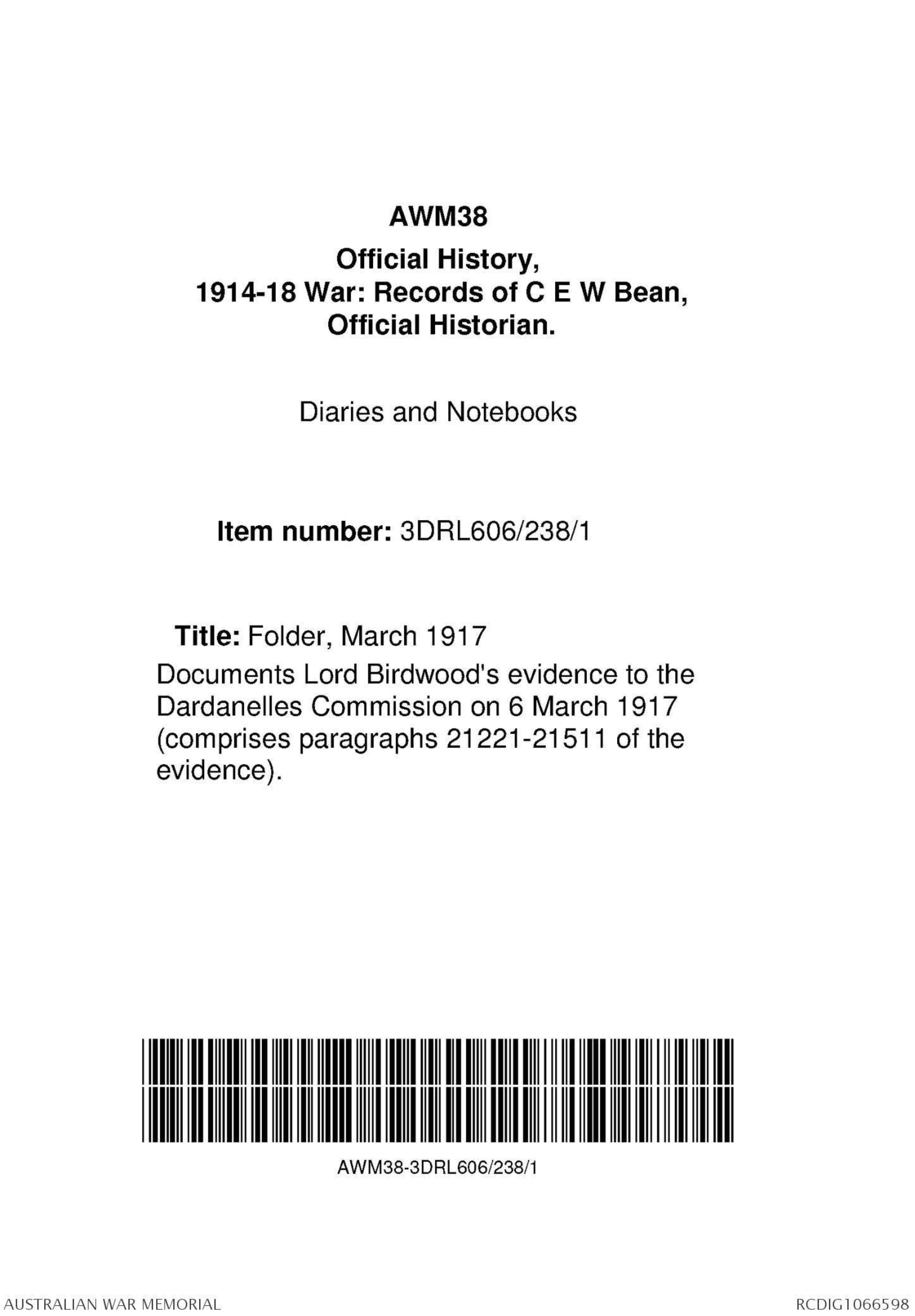
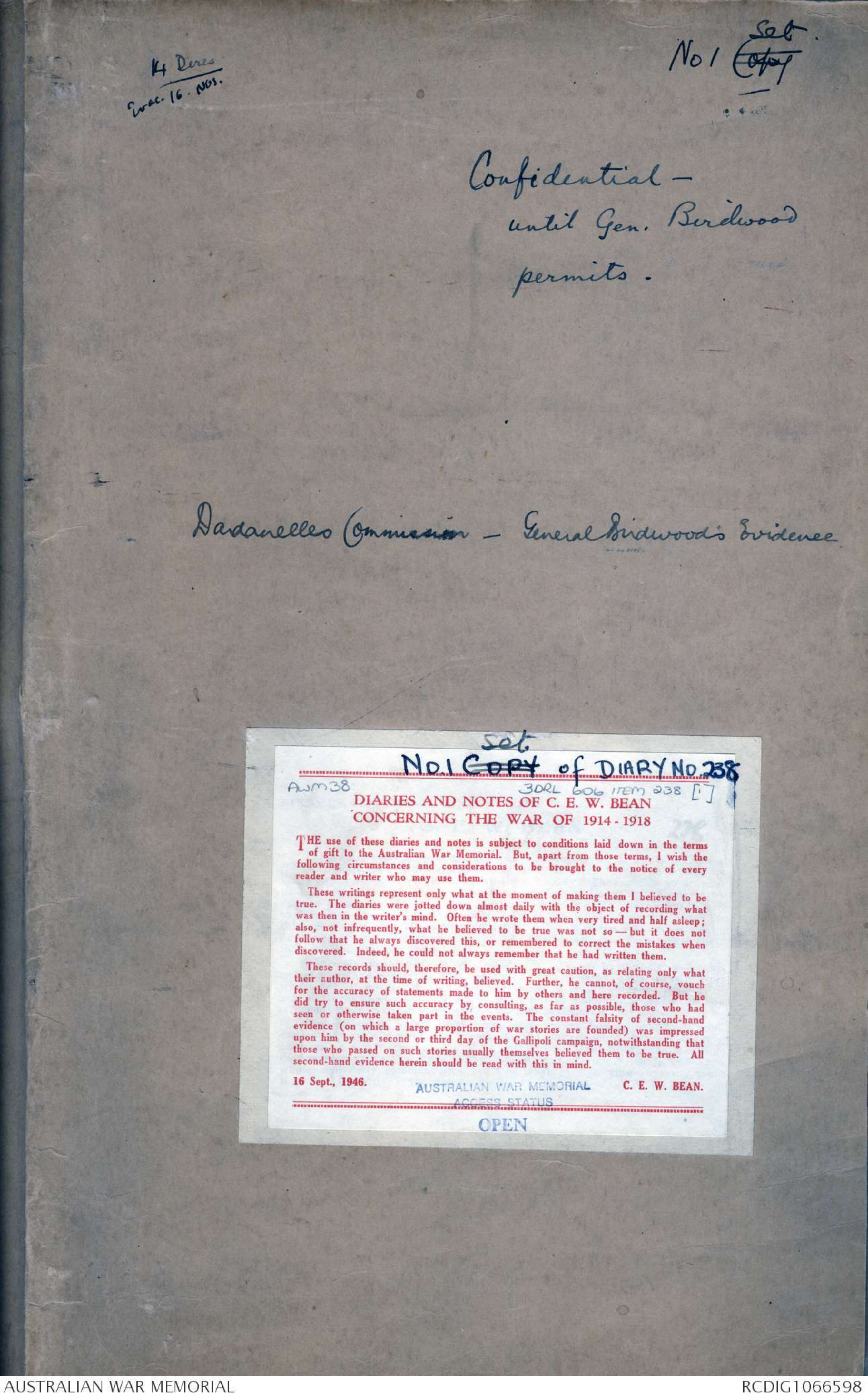
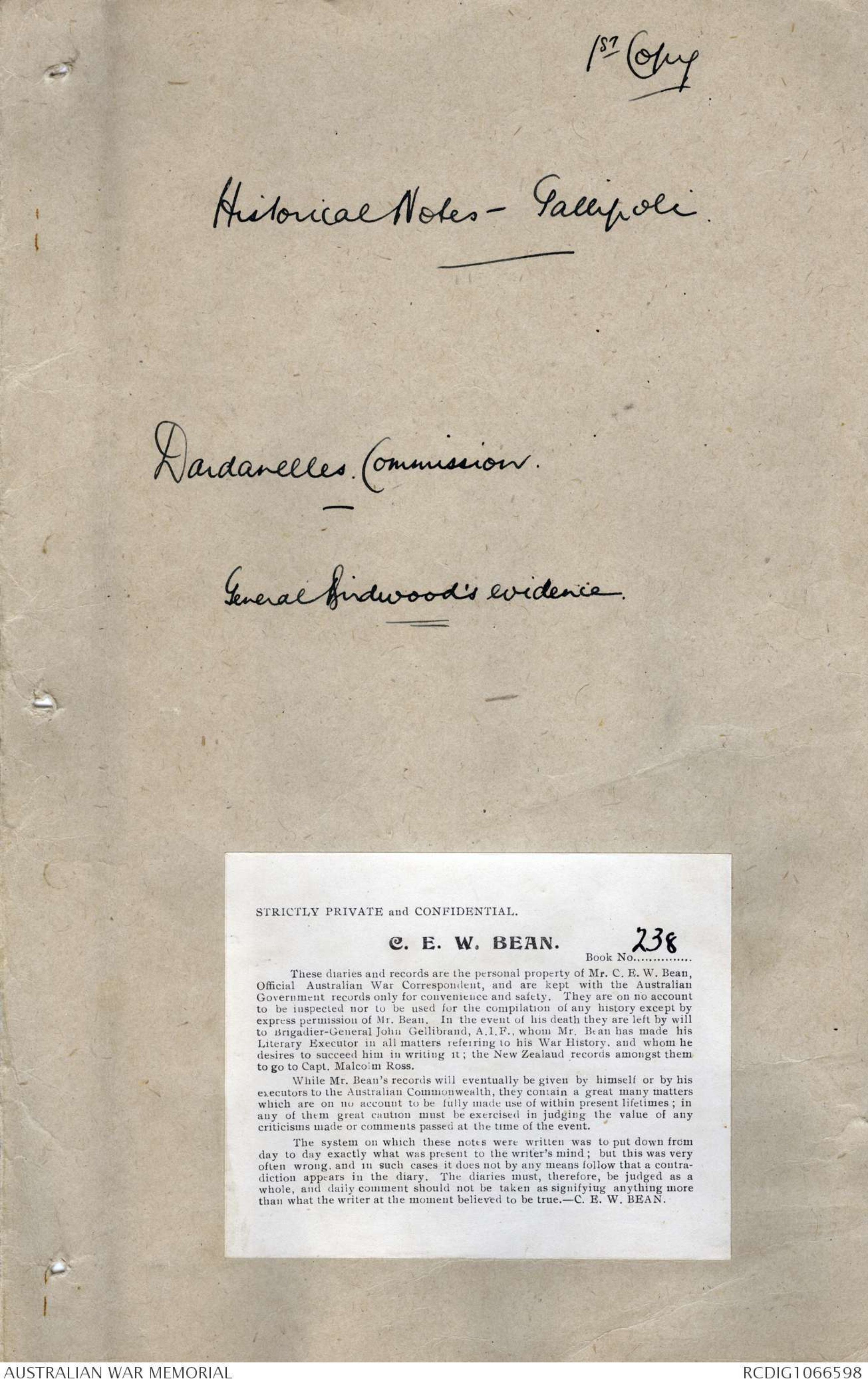
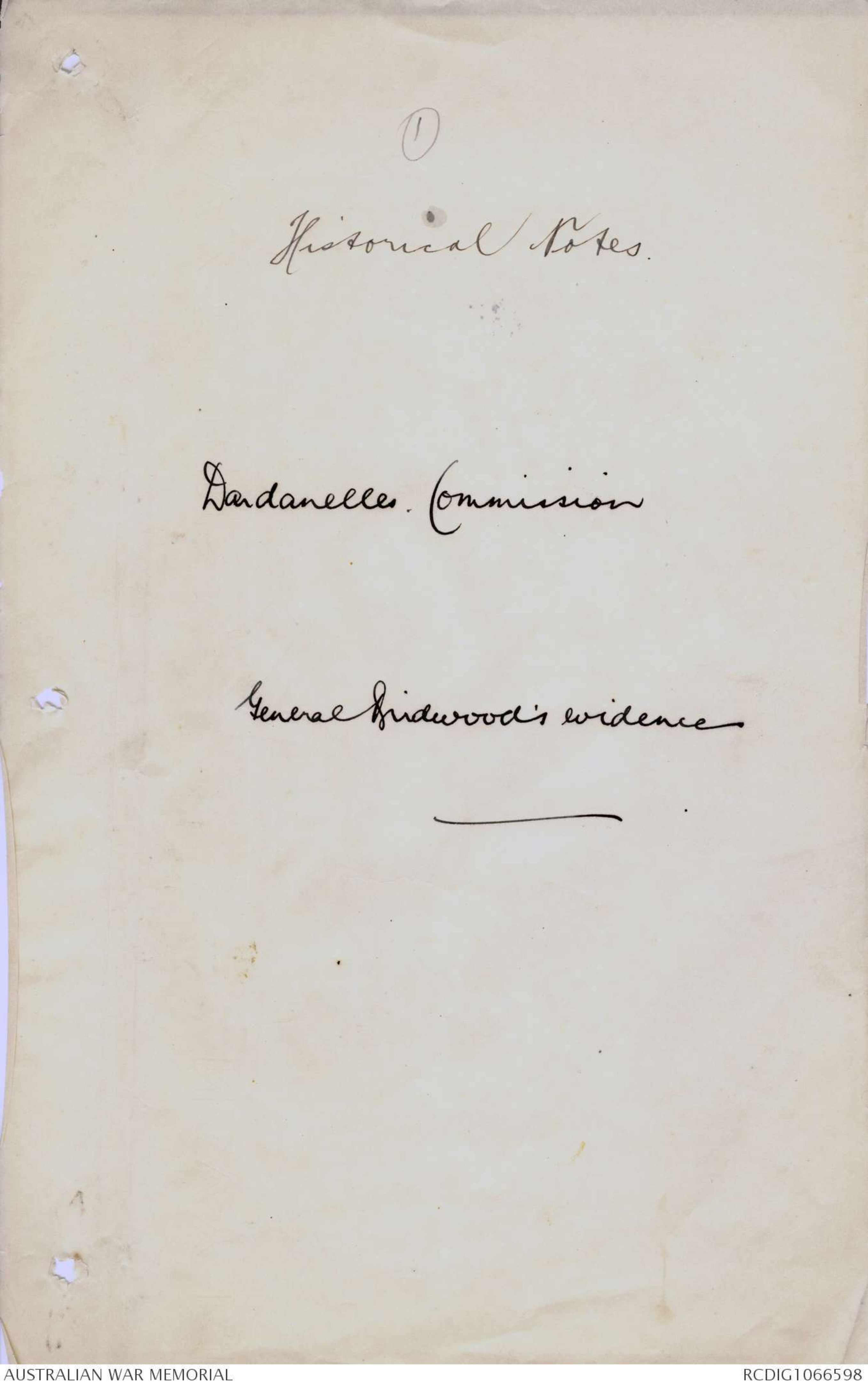
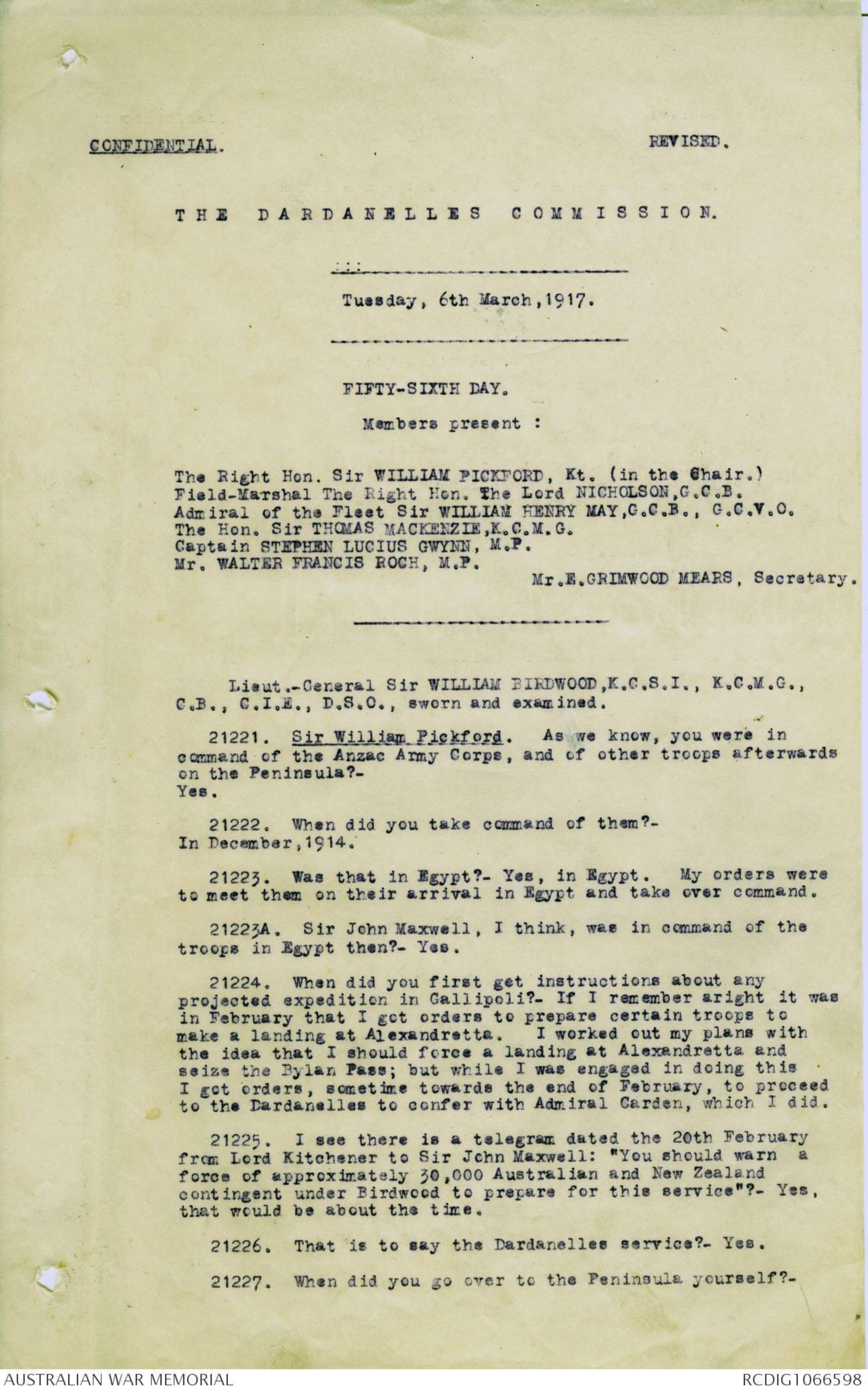
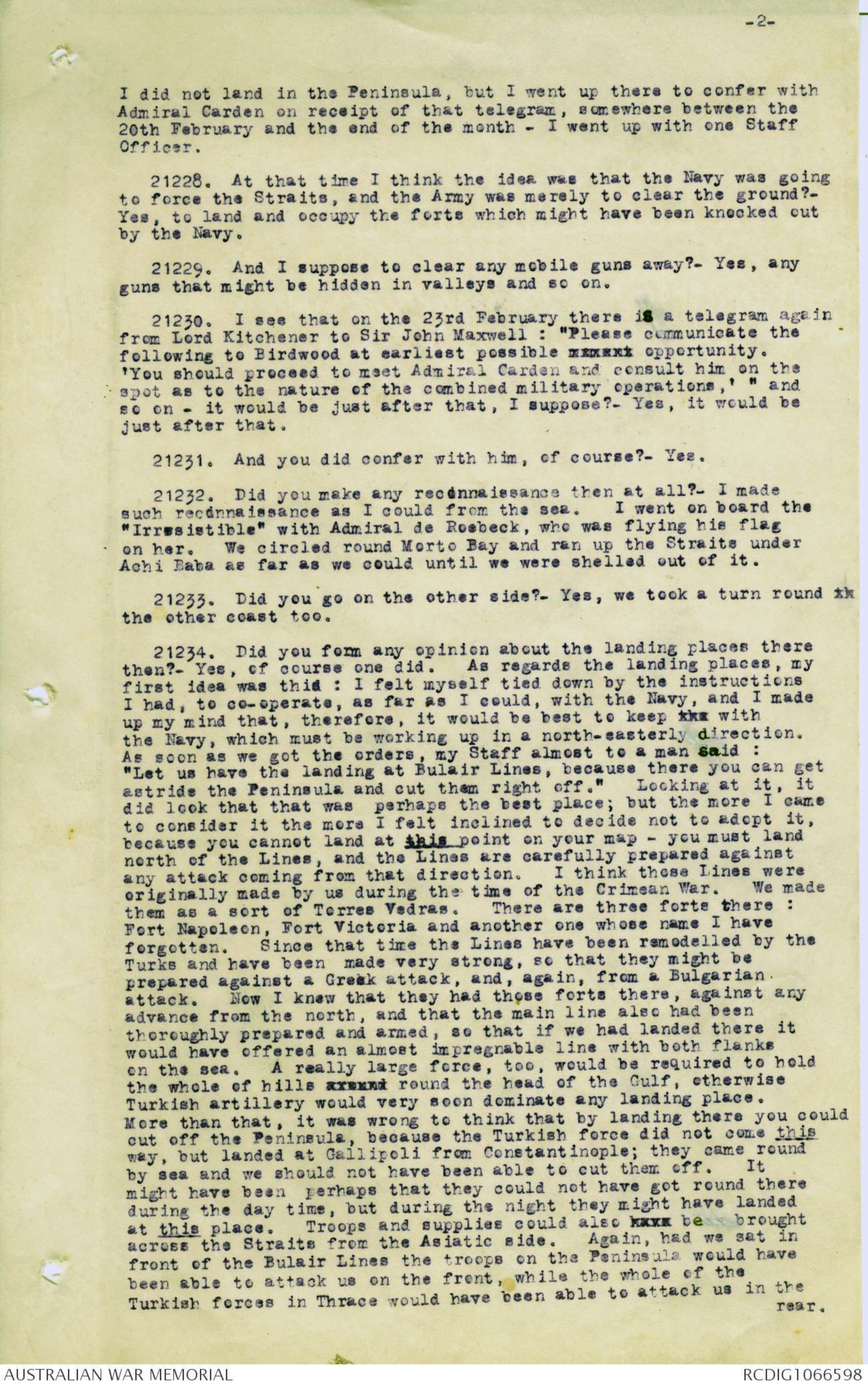
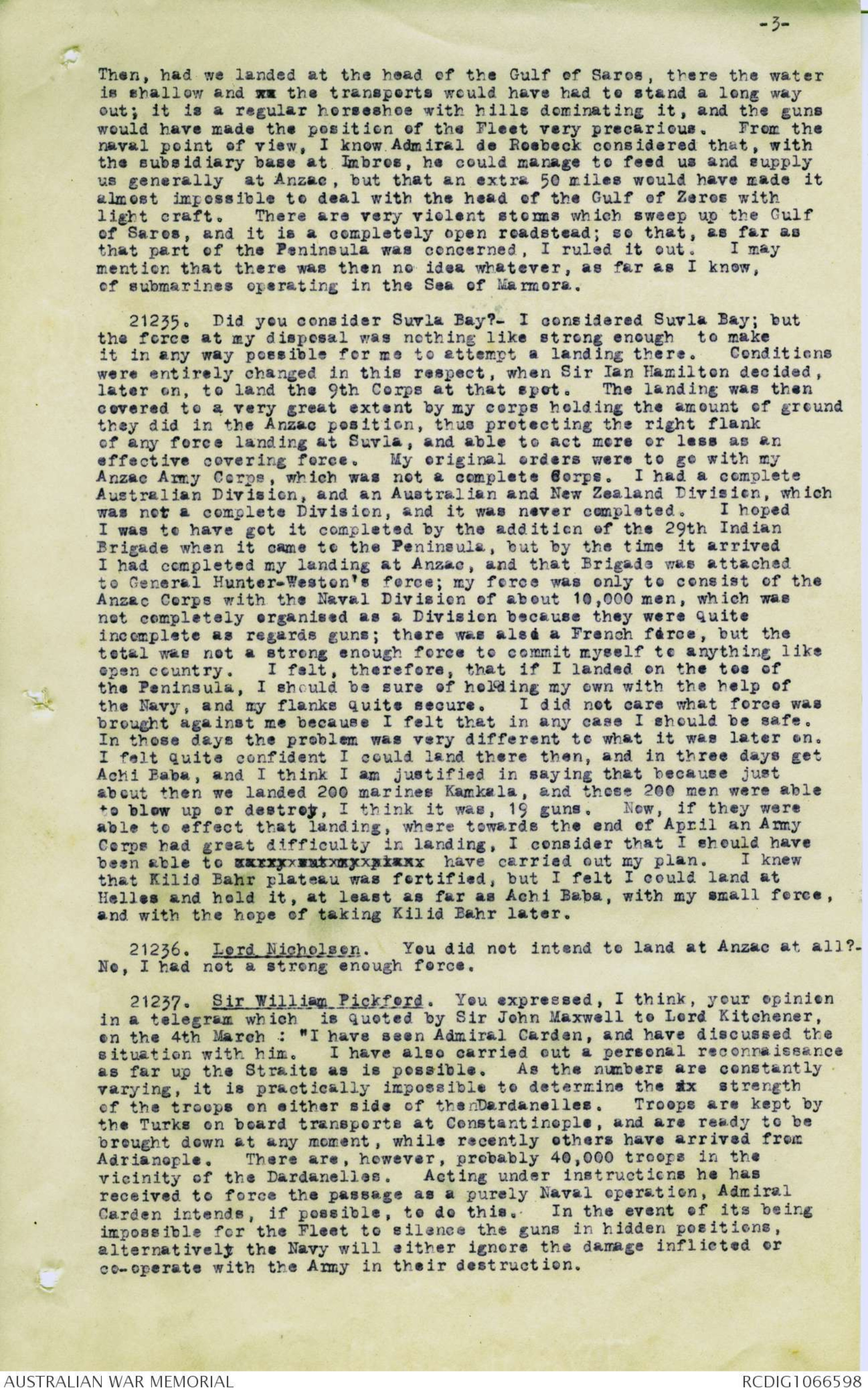
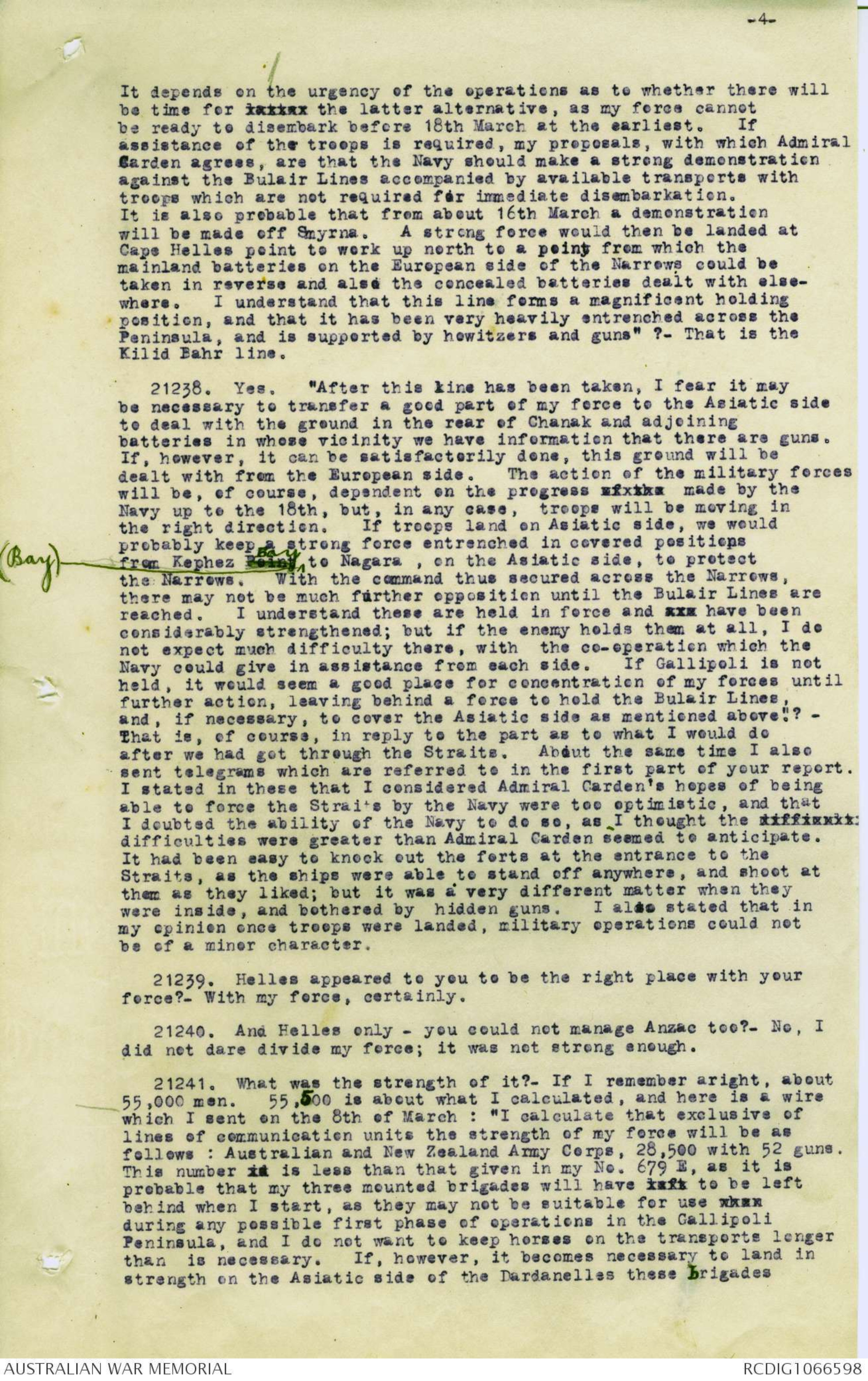
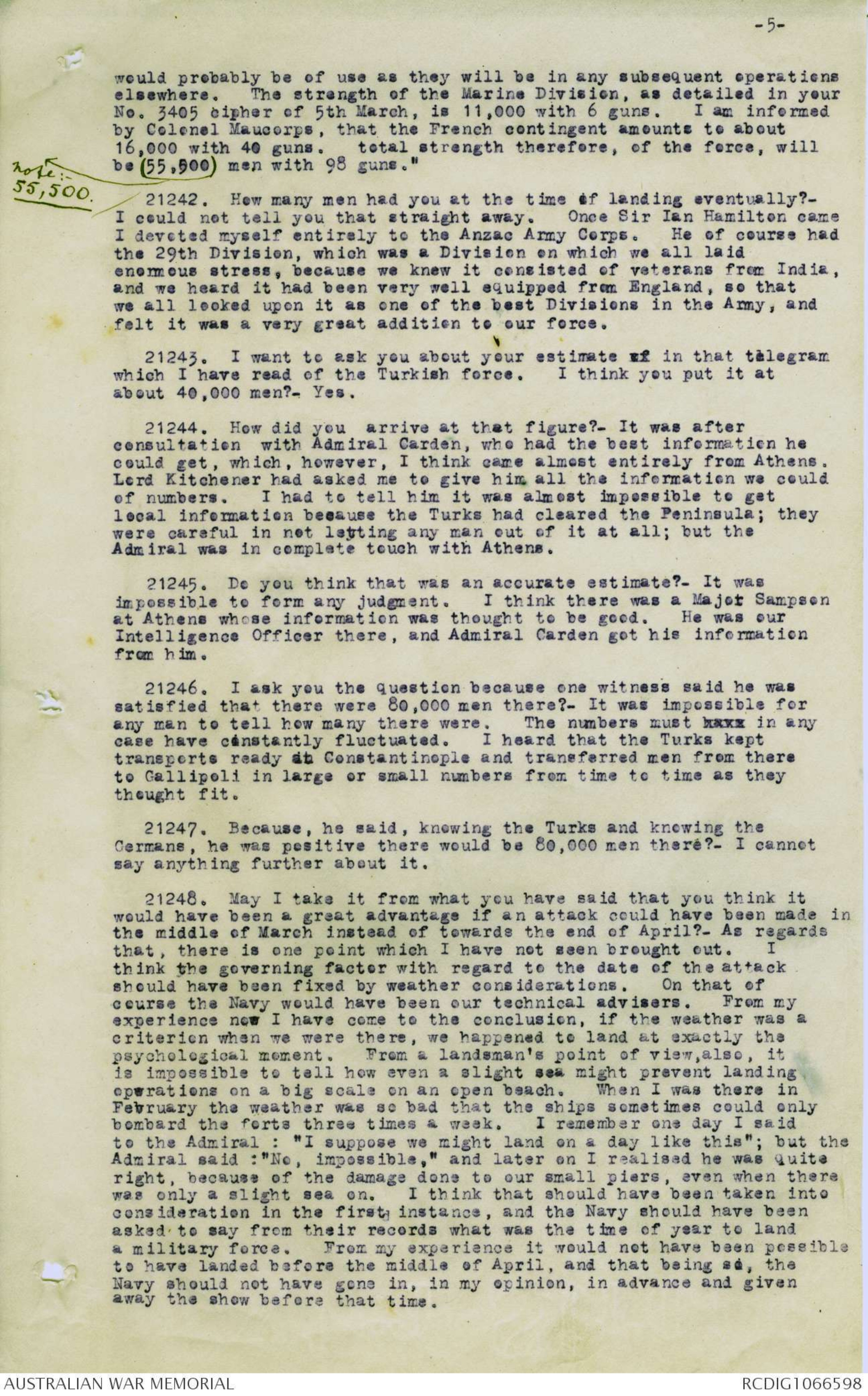
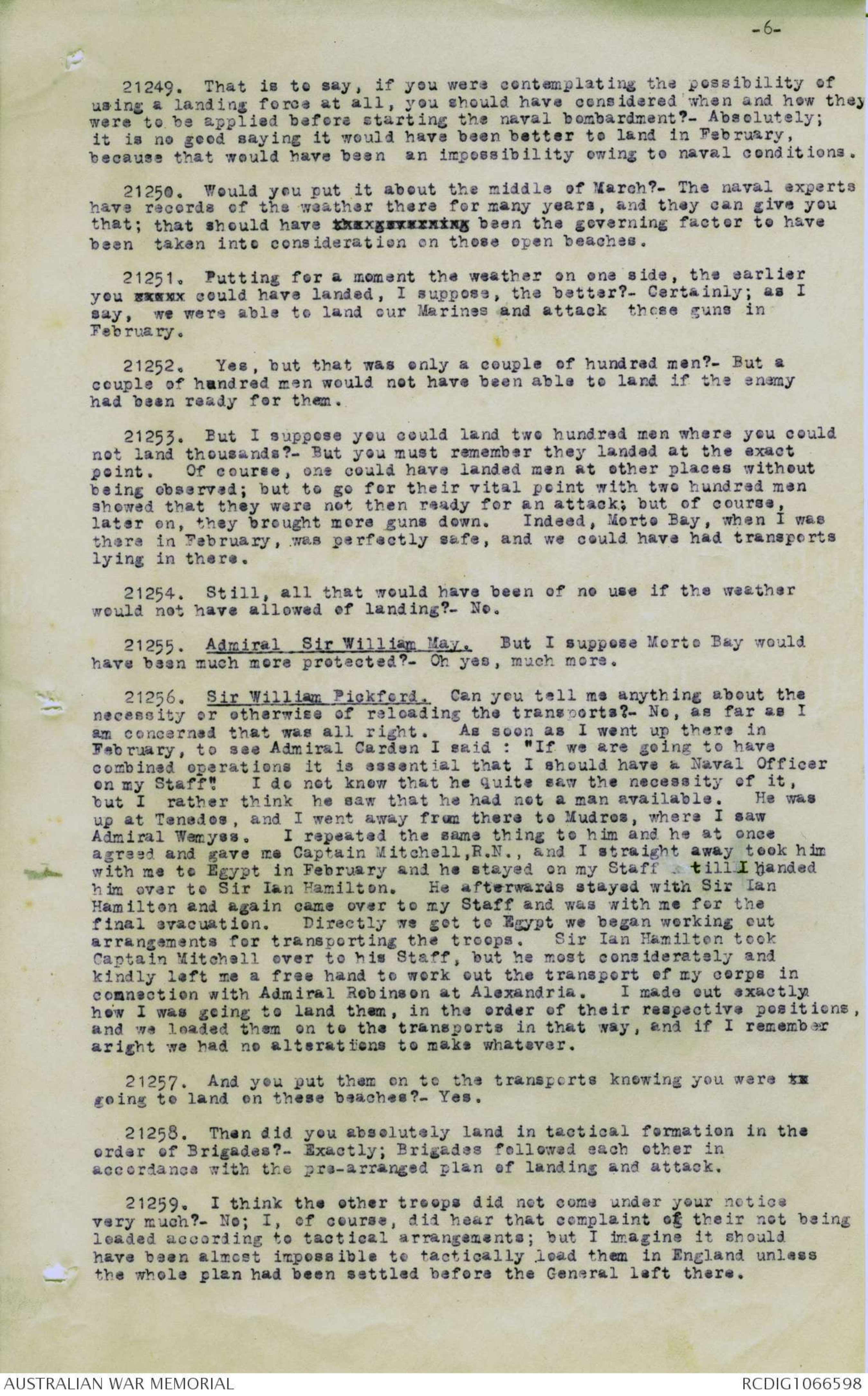
AWM38
Official History,
1914-18 War: Records of C E W Bean,
Official Historian.
Diaries and Notebooks
Item number: 3DRL606/238/1
Title: Folder, March 1917
Documents Lord Birdwood's evidence to the
Dardanelles Commission on 6 March 1917
(comprises paragraphs 21221-21511 of the
evidence).
AWM38-3DRL606/238/1
No 1 Copy Set
[*14 Deres
Evac. 16. NOS.
Confidential -
until Gen. Birdwood
permits.*]
Dardanelles Commission - General Birdwood's Evidence
No.1 COPY Set of DIARY NO.238.
AWM38
3DRL 606 ITEM 238 [1]
DIARIES AND NOTES OF C. E. W. BEAN
CONCERNING THE WAR OF 1914 - 1918
THE use of these diaries and notes is subject to conditions laid down in the terms
of gift to the Australian War Memorial. But apart from these terms, I wish the
following circumstances and considerations to be brought to the notice of every
reader and writer who may use them.
These writings represent only what at the moment of making them I believed to be
true. The diaries were jotted down almost daily with the object of recording what
was then in the writer's mind. Often he wrote them when very tired and half-asleep;
also, not infrequently what he believed to be true was not so - but it does not
follow that he always discovered this, or remembered to correct the mistakes when
discovered. Indeed, he could not always remember that he had written them.
These records should, therefore, be used with great caution, as relating only what
their author, at the time of writing believed. Further, he cannot, of course, vouch
for the accuracy of statements made to him by others and here recorded. But he
did try to ensure such accuracy by consulting, as far as possible, those who had
seen or otherwise taken part in the events. The constant falsity of second-hand
evidence (on which a large proportion of war stories are founded) was impressed
upon him by the second or third day of the Gallipoli campaign, notwithstanding that
those who passed on such stories usually themselves believed them to be true. All
second-hand evidence herein should be read with this in mind.
16 Sept., 1946. C. E. W. BEAN
AUSTRALIAN WAR MEMORIAL
ACCESS STATUS
OPEN
1st Copy
Historical Notes - Gallipoli
Dardanelles Commission
General Birdwood's evidence.
STRICTLY PRIVATE and CONFIDENTIAL
C. E. W. BEAN
Book No. 238
These diaries and records are the personal property of Mr. C. E. W. Bean,
Official Australian War Correspondent. and are kept with the Australian
Government records only for convenience and safety. They are on no account
to be inspected nor to be used for the compilation of any history except by
express permission of Mr. Bean. In the event of his death they are left by will
to Brigadier-General John Gellibrand, A.I.F., whom Mr. Bean has made his
Literary Executor in all matters referring to his War History, and whom he
desires to succeed him in writing it; the New Zealand records amongst them
to go to Capt. Malcolm Ross.
While Mr Bean's records will eventually be given by himself or by his
executors to the Australian Commonwealth, they contain a great many matters
which are on no account to be fully made use of within present lifetimes; in
any of them great caution must be be exercised in judging the value of any
criticisms made or comments passed at the time of the event.
The system on which these notes were written was to put down from
day to day exactly what was present to the writer's mind; but this was very
often wrong, and in such cases it does not by any means follow that a contradiction
appears in the diary. The diaries must, therefore, be judged as a
whole, and daily comment should not be taken as signifying anything more
than what the writer at the moment believed to be true. - C. E. W. BEAN.
(1(
Historical Notes
Dardanelles Commission
General Birdwood's evidence
CONFIDENTIAL. REVISED.
THE DARDANELLES COMMISSION
Tuesday, 6th March, 1917.
FIFTY-SIXTH DAY.
Members present :
The Right Hon. Sir WILLIAM PICKFORD, Kt. (in the Chair.)
Field-Marshal The Right Hon. The Lord NICHOLSON,G.C.B.
Admiral of the Fleet Sir WILLIAM HENRY MAY,G.C.B.,G.C.V.O.
The Hon. Sir THOMAS MACKENZIE, K.C.M.G.
Captain STEPHEN LUCIUS GWYNN, M.P.
Mr. WALTER FRANCIS ROCH, M.P.
Mr.E.GRIMWOOD MEARS, Secretary.
Lieut.-General Sir WILLIAM BIRDWOOD, K.C.S.I., K.C.M.G.,
C.B., C.I.E., D.S.O., sworn and examined.
21221. Sir William Pickford. As we know, you were in
command of the Anzac Army Corps, and of other troops afterwards
on the Peninsula?-
Yes.
21222. When did you take command of them?-
In December, 1914.
21223. Was that in Egypt?- Yes, in Egypt. My orders were
to meet them on their arrival in Egypt and take over command.
21223A. Sir John Maxwell, I think, was in command of the
troops in Egypt then?- Yes.
21224. When did you first get instructions about any
projected expedition in Gallipoli?- If I remember aright it was
in February that I got orders to prepare certain troops to
make a landing at Alexandretta. I worked out my plans with
the idea that I should force a landing at Alexandretta and
seize the Bylan Pass; but while I was engaged in doing this
I got orders, sometime towards the end of February, to proceed
to the Dardanelles to confer with Admiral Carden, which I did.
21225. I see there is a telegram dated the 20th February
from Lord Kitchener to Sir John Maxwell: "You should warn a
force of approximately 30,000 Australian and New Zealand
contingent under Birdwood to prepare for this service"?- Yes,
that would be about the time.
21226. That is to say the Dardanelles service?- Yes.
21227. When did you go over to the Peninsula yourself?-
-2-
I did not land in the Peninsula, but I went up there to confer with
Admiral Carden on receipt of that telegram, somewhere between the
20th February and the end of the month - I went up with one Staff
Officer.
21228. At that time I think the idea was that the Navy was going
to force the Straits, and the Army was merely to clear the ground?-
Yes, to land and occupy the forts which might have been knocked out
by the Navy.
21229. And I suppose to clear any mobile guns away?- Yes, any
guns that might be hidden in valleys and so on.
212230. I see that on 23rd February there is a telegram again
from Lord Kitchener to Sir John Maxwell : "Please communicate the
following to Birdwood at earliest possible moment opportunity.
'You should proceed to meet Admiral Carden and consult him on the
spot as to the nature of the combined military operations,' " and
so on - it would be just after that, I suppose?- Yes, it would be
just after that.
21231. And did you confer with him, of course?- Yes.
21232. Did you make any reconnaissance then at all?- I made
such reconnaissance as I could from the sea. I went on board the
"Irresistible" with Admiral de Roebeck, who was flying his flag
on her. We circled round Morto Bay and ran up the Straits under
Achi Baba as far as we could until we were shelled out of it.
21233. Did you go on the other side?- Yes, we took a turn round xx
the other coast too.
21234. Did you form any opinion about the landing places there
then?- Yes, of course one did. As regards the landing places, my
first idea was this : I felt myself tied down by the instructions
I had, to co-operate, as far as I could, with the Navy, and I made
up my mind that, therefore, it would be best to keep the with
the Navy, which must be working up in a north-easterly direction.
As soon as we got the orders, my Staff almost to a man said :
"Let us have a landing at Bulair Lines, because there you can get
astride the Peninsula and cut them right off." Looking at it, it
did look that that was perhaps the best place; but the more I came
to consider it the more I felt inclined to decide not to adopt it,
because you cannot land at this point on your map - you must land
north of the Lines, and the Lines are carefully prepared against
any attack coming from that direction. I think those Lines were
originally made by us during the time of the Crimean War. We made
them as a sort of Torres Vedras. There are three forts there :
Fort Napoleon, Fort Victoria and another one whose name I have
forgotten. Since that time the Lines have been remodelled by the
Turks and have been made very strong, so that they might be
prepared against a Greek attack, and, again, from a Bulgarian
attack. Now I knew that they had those forts there, against any
advance from the north, and that the main line also had been
thoroughly prepared and armed, so that if we had landed there it
would have offered an almost impregnable line with both flanks
on the sea. A really large force, too, would be required to hold
the whole of hills around round the head of the Gulf, otherwise
Turkish artillery would very soon dominate any landing place.
More than that, it was wrong to think that by landing there you could
cut off the Peninsula, because the Turkish force did not come this
way, but landed at Gallipoli from Constantinople; they came round
by sea and we should not have been able to cut them off. It
might have been perhaps that they could not have got round there
during the day time, but during the night they might have landed
at this place. Troops and supplies could also have be brought
across the Straits from the Asiatic side. Again, had we sat in
front of the Bulair Lines the troops on the Peninsula would have
been able to attack us on the front, while the whole of the
Turkish forces in Thrace would have been able to attack us in the
rear.
-3-
Then, had we landed at the head of the Gulf of Saros, there the water
is shallow and xx the transports would have had to stand a long way
out; it is a regular horseshoe with hills dominating it, and the guns
would have made the position of the Fleet very precarious. From the
naval point of view, I know Admiral de Roebeck considered that, with
the subsidiary base at Imbros, he could manage to feed us and supply
us generally at Anzac, but that an extra 50 miles would have made it
almost impossible to deal with the head of the Gulf of Zeros with
light craft. There are very violent storms which seep up the Gulf
of Saros, and it is a completely open roadstead; so that, as far as
that part of the Peninsula was concerned, I ruled it out. I may
mention there was then no idea whatever, as far as I knew,
of submarines operating in the Sea of Marmora.
21235. Did you consider Suvla Bay?- I considered Suvla Bay; but
the force at my disposal was nothing like strong enough to make
it in any way possible for me to attempt a landing there. Conditions
were entirely changed in this respect, when Sir Ian Hamilton decided ,
later on, to land the 9th Corps at that spot. The landing was then
covered to a very great extent by my Corps holding the amount of ground
they did in the Anzac position, thus protecting the right flank
of any force landing at Suvla, and able to act more or less as an
effective covering force. My original orders were to go with my
Anzac Amy Corps, which was not a complete Corps. I had a complete
Australian Division, and an Australian and New Zealand Division, which
was not a complete Division, and it was never completed. I hoped
I was to have got it completed by the addition of the 29th Indian
Brigade when it came to the Peninsula, but by the time it arrived
I had completed my landing at Anzac, and that Brigade was attached
to General Hunter-Weston's force; my force was only to consist of the
Anzac Corps with the Naval Division of about 10,000 men, which was
not completely organised as a Division because they were quite
incomplete as regards guns; there was also a French force, but the
total was not a strong enough force to commit myself to anything like
open country. I felt, therefore, that if I landed on the toe of
the Peninsula, I should be sure of holding my own with the help of
the navy, and my flanks quite secure. I did not care what force was
brought against me because I felt that in any case I should be safe.
In those days the problem was very different to what it was later on.
I felt quite confident I could land there then, and in three days get
Achi Baba, and I think I am justified in saying that because just
about then we landed 200 marines Kamkala, and those 200 men were able
to blow up or destroy, I think it was, 19 guns. Now if they were
able to effect that landing, where towards the end of April an Army
Corps had great difficulty in landing, I consider that I should have
been able to xxxx xxx xxxxx xxxx have carried out my plan. I knew
that Kilid Bahr plateau was fortified, but I felt I could land at
Helles and hold it, at least as far as Achi Baba, with my small force,
and with the hope of taking Kilid Bahr later.
21236. Lord Nicholson. You did not intend to land at Anzac at all?-
No, I had not a strong enough force.
21237. Sir William Pickford. You expressed, I think, your opinion
in a telegram which is quoted by Sir John Maxwell to Lord Kitchener,
on the 4th March : "I have seen Admiral Carden, and have discussed the
situation with him. I have also carried out a personal reconnaissance
as far up the Straits as is possible. As the numbers are constantly
varying, it is practically impossible to determine the xx strength
of the troops on either side of the Dardanelles. Troops are kept by
the Turks on board transports at Constantinople, and are ready to be
brought down at any moment, while recently others have arrived from
Adrianople. There are, however, probably 40,000 troops in the
vicinity of the Dardanelles. Acting under instructions he has
received to force the passage as a purely Naval operation, Admiral
Carden intends, if possible, to do this. In the event of its being
impossible for the Fleet to silence the guns in hidden positions,
alternatively the Navy will either ignore the damage inflicted or
co-operate with the Army in their destruction.
-4-
It depends on the urgency of the operations as to whether there will
be time for latter the latter alternative, as my force cannot
be ready to disembark before 18th March at the earliest. If
assistance of the troops is required, my proposals, with which Admiral
Carden agrees, are that the Navy should make a strong demonstration
against the Bulair Lines accompanied by available transports with
troops which are not required for immediate disembarkation.
It is also probable that from about 16th March a demonstration
will be made off Smyrna. A strong force would then be landed at
Cape Helles point to work up north to a point from which the
mainland batteries on the European side of the Narrows could be
taken in reverse and also the concealed batteries dealt with elsewhere.
I understand that this line forms a magnificent holding
position, and that it had been very heavily entrenched across the
Peninsula, and is supported by howitzers and guns" ?- That is the
Kilid Bahr line.
21238. Yes. "After this line has been taken, I fear it may
be necessary to transfer a good part of my force to the Asiatic side
to deal with the ground in the rear of Chanak and adjoining
batteries in whose vicinity we have information that there are guns.
If, however , it can be satisfactorily done, this ground will be
dealt with from the European side. The action of the military forces
will be, of course, dependent on the progress of the made by the
Navy up to the 18th, but, in any case, troops will be moving in
the right direction. If troops land on Asiatic side, we would
probably keep a strong force entrenched in covered positions
from Kephez Point ^Bay to Nagara, on the Asiatic side, to protect
[*(Bay)*]
the Narrows. With the command thus secured across the Narrows,
there may not be much further opposition until the Bulair Lines are
reached. I understand these are held in force and xxx have been
considerably strengthened; but if the enemy holds them at all, I do
not expect much difficulty there, with the co-operation which the
Navy could give in assistance from each side. If Gallipoli is not
held, it would seem a good place for concentration of my forces until
further action, leaving behind a force to hold the Bulair Lines,
and, if necessary, to cover the Asiatic side as mentioned above."? -
That is, of course, in reply to the part as to what I would do
after we had got through the Straits. About the same time I also
sent telegrams which are referred to in the first part of your report.
I stated in these that I considered Admiral Carden's hopes of being
able to force the Straits by the Navy were too optimistic, and that
I doubted the ability of the Navy to do so, as I thought the difficult
difficulties were greater than Admiral Carden seemed to anticipate.
It had been easy to knock out the fort at the entrance to the
Straits, as the ships were able to stand off anywhere, and shoot at
them as they liked; but a very different matter when they
were inside, and bothered by hidden guns. I also stated that in
my opinion once troops were landed, military operations could not
be of a minor character.
21239. Helles appeared to you to be the right place with your
force?- With my force, certainly.
21240. And Helles only - you could not manage Anzac too?- No, I
did not dare divide my force; it was not strong enough.
21241. What was the strength of it?- If I remember aright, about
55,000 men. 55,500 is about what I calculated, and here is a wire
which I sent on the 8th of March : "I calculate that exclusive of
lines of communication units the strength of my force will be as
follows : Australian and New Zealand Army Corps, 28,500 with 52 guns.
This number id is less than that given in my No. 679E, as it is
probable that my three mounted brigades will have left to be left
behind when I start, as they may not be suitable for use when
during any possible first phase of operations in the Gallipoli
Peninsula, and I do not want to keep horses on the transports longer
than is necessary. If, however, it becomes necessary to land in
strength on the Asiatic side of the Dardanelles these brigades
-5-
would probably be of use as they will be in any subsequent operations
elsewhere. The strength of the Marine Division, as detailed in your
No. 3405 cipher of 5th March, is 11,000 with 6 guns. I am informed
by Colonel Maucorps, that the French contingent amounts to about
16,000 with 40 guns. total strength therefore, of the force, will
be (55,500) men with 98 guns."
[*note:-
55,500.*]
21242. How many men had you at the time of landing eventually?-
I could not tell you that straight away. Once Sir Ian Hamilton came
I devoted myself entirely to the Anzac Army Corps. He of course had
the 29th Division, which was a Division on which we all laid
enormous stress, because we knew it consisted of veterans from India,
and we heard it had been very well equipped from England, so that
we all looked upon it as one of the best Divisions in the Army, and
felt it was a very great addition to our force.
21243. I want to ask you about your estimate of in that telegram
which I read of the Turkish force. I think you put it at
about 40,000 men?- Yes.
21244. How did you arrive at that figure?- It was after
consultation with Admiral Carden, who had the best information he
could get, which, however, I think came almost entirely from Athens.
Lord Kitchener had asked me to give him all the information we could
of numbers. I had to tell him it was almost impossible to get
local information because the Turks had cleared the Peninsula; they
were careful in not letting any man out of it at all; but the
Admiral was in complete touch with Athens.
21245. Do you think that was an accurate estimate?- It was
impossible to form any judgment. I think there was a Major Sampson
at Athens whose information was thought to be good. He was our
Intelligence Officer there, and Admiral Carden got his information
from him.
21246. I ask you the question because one witness said he was
satisfied that there were 80,000 men there?- It was impossible for
any man to tell how many there were. The numbers must have in any
case have constantly fluctuated. I heard that the Turks kept
transports ready at Constantinople and transferred men from there
to Gallipoli in large or small numbers from time to time as they
thought fit.
21247. Because, he said, knowing the Turks and knowing the
Germans, he was positive there would be 80,000 men there?- I cannot
say anything further about it.
21248. May I take it from what you have said that you think it
would have been a great advantage if an attack could have been made in
the middle of March instead of towards the end of April?- As regards
that, there is one point which I have not seen brought out. I
think the governing factor with regard to the date of the attack
should have been fixed by weather considerations. On that of
course the Navy would have been our technical advisers. From my
experience now I have come to the conclusion, if the weather was a
criterion when we were there, we happened to land at exactly the
psychological moment. From a landsman's point of view,also, it
is impossible to tell how even a slight sea might prevent landing
operations on a big scale on an open beach. When I was there in
February the weather was so bad that the ships sometimes could only
bombard the forts three times a week. I remember one day I said
to the Admiral :"I suppose we might land on a day like this"; but the
admiral said :"No, impossible," and later on I realised he was quite
right, because of the damage done to our small piers, even when there
was only a slight sea on. I think that should have been taken into
consideration in the first instance, and the Navy should have been
asked to say from their records what was the time of the year to land
a military force. From my experience it would not have been possible
to have landed before the middle of April, and that being so, the
Navy should not have gone in, in my opinion, in advance and given
away the show before that time.
-6-
211249. That is to say, if you were contemplating the possibility of
using a landing force at all, you should have considered when & how they
were to be applied before starting the naval bombardment?. Absolutely;
it is not good saying it would have been better to land in February,
because that would have been an impossibility owing to naval conditions.
21250. Would you put it about the middle of March?- The naval experts
have records of the weather there for many years, and they can give you
that; that should have the governing been the governing factor to have
been taken into consideration on these open beaches.
21251. Putting for a moment the weather on one side, the earlier
you xxxxx could have landed, I suppose, the better?- Certainly; as I
say, we were able to land our marines and attack three guns in
February.
21252. Yes, but that was only a couple of hundred men?- But a
couple of hundred men would not have been able to land if the enemy
had been ready for them.
21253. But I suppose you could land two hundred men where you could
not land thousands?- But you must remember they landed at the exact
point. Of course, one could have landed men at other places without
being observed; but to go for their vital point with two hundred men
showed they were not then ready for an attack; but of course,
later on, they brought more guns down. Indeed, Morto Bay, when I was
there in February, was perfectly safe, and we could have had transports
lying in there.
21254. Still, all that would have been of no use if the waether
would not have allowed of landing?- No.
21255. Admiral Sir William May. But I suppose Morto Bay would
have been much more protected?- Oh yes, much more.
21256. Sir William Pickford. Can you tell me anything about the
necessity or otherwise of reloading the transports?- No, as far as I
am concerned that was all right. As soon as I went up there in
February, to see Admiral Carden I said : "If we are going to have
combined operations if is essential that I should have a Naval Officer
on my Staff". I do not know that he quire saw the necessity of it,
but I rather think he saw that he had not a man available. He was
up at Tenedos, and I went away from there to Mudros, where I saw
Admiral Wemyss. I repeated the same thing to him and he at once
agreed and gave me Captain Mitchell,R.N., and I straight away took him
with me to Egypt in February and he stayed on my Staff till I handed
him over to Sir Ian Hamilton. He afterwards stayed with Sir Ian
Hamilton and again came over to my Staff and was with me for the
final evacuation. Directly we got to Egypt we began working out
arrangements for transporting the troops. Sir Ian Hamilton took
Captain Mitchell over to his Staff, but he most considerately and
kindly left me a free hand to work out the transport of my corps in
connection with Admiral Robinson at Alexandria. I made out exactly
how I was going to land them, in order of their respective position,
and we loaded them on to the transports in that way, and if I remember
aright we had no alterations to make whatever.
21257. And you put them on to the transports knowing you were xx
going to land on these beaches?- Yes.
21258. Then did you absolutely land in tactical formation in the
order of Brigades?- Exactly; Brigades followed each other in
accordance with the pre-arranged plan of landing and attack.
21259. I think the other troops did not come under your notice
very much?- No; I of course, did hear that complaint of their not being
loaded according to tactical arrangements; but I imagine it should
have been almost impossible to tactically load them in England unless
the whole plan had been settled before the General left there.
 Deb Parkinson
Deb ParkinsonThis transcription item is now locked to you for editing. To release the lock either Save your changes or Cancel.
This lock will be automatically released after 60 minutes of inactivity.